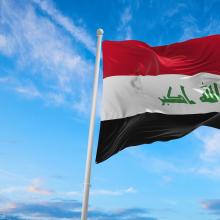November 10, 2022
Author: Abdul-Jawad Elhusuni ; Licensed under CC-BY-SA-3.0
Following its ratification on October 26, 2021, the Libyan House of Representatives decided to bring into force the Anti-Cybercrime Law by officially publishing it on September 27, 2022. This happened without prior notice and in complete disregard of demands from civil society organizations and four UN Special Rapporteurs for the law to be withdrawn. The law in question infringes on fundamental human rights principles, as well as Libya’s international commitments, as its drafting process did not include stakeholder dialogue and engagement.
Libya’s House of Representatives did not publicly share the law until a few days after it came into force, when it was posted on its Facebook page. Before this it was only available as a leaked draft on social media. The following statement highlights our main concerns regarding the risks of this law.
Broad, ambiguous terminology that contravenes international human rights standards
Article 4 of the Anti-Cybercrime Law states that “the use of the Internet and modern technological means is considered to be legal, provided that public order and morality are respected.” By implication, therefore, any usage of technology deemed to violate these ambiguous concepts of ‘public order’ or ‘morality’ is illegal.
Article 7 allows Libya’s National Information Security and Safety Authority (NISSA) to censor anything that disseminates prejudices or ideas that may “undermine the security of the society and its social peace,” without clearly defining the concepts of ‘security’ or ‘social peace.’ Furthermore, Article 8 requires the NISSA to block access to websites and pages containing materials that are “contrary to public morality,” while Article 37 provides for harsh prison and financial sanctions against “anyone who spreads a rumor or publishes information or data that threatens security or public safety in Libya or any other country.”
Such broad, ambiguous terminology violates international human rights standards for drafting legislation that restricts freedom of opinion and expression. According to General Comment No. 34 of the Human Rights Committee on Article 19 of the International Covenant on Civil and Political Rights, which Libya ratified on May 15, 1970, any such laws must be formulated “with sufficient precision to enable an individual to regulate his or her conduct accordingly.” Inaccuracy in this law’s provisions could give Libya’s judicial authorities, or the Executive represented by the NISSA, extensive discretionary powers to restrict usage of digital spaces and thus limit freedom of expression and opinion, as well as the right to peaceful assembly and association, without clear, legal, legitimate, and predetermined controls in place.
It enables extensive, warrantless censorship and content blocking
Article 7 of the Anti-Cybercrime Law is particularly dangerous as it allows the NISSA to extensively censor everything published on the internet or “any other technical system,” as well as anything that may disseminate prejudices or ideas that “undermine the security of the society and its social peace.” Granting extensive discretionary powers to an executive body, via the use of vague and ambiguous terms, contradicts Libya’s international commitments; namely the International Covenant on Civil and Political Rights.
Human rights organizations have warned the Libyan authorities about this, as have the UN Special Rapporteurs in a joint communication sent on March 31, 2022. This communication highlighted that any censorship of electronic content should always be carried out within a defined framework, following an independent and impartial judicial authority’s decision, and following the principles of legality, necessity, and proportionality. The rapporteurs also noted that States should refrain from any monitoring of online content and activity, which is permitted by Article 7 of this law.
“Any other technical system” is a particularly problematic and ambiguous phrase, as it makes it hard to know to what extent the NISSA is allowed to monitor other technological and communication media not covered by this law. This level of ambiguity could be exploited by the Executive, in absence of any judicial checks and balances during their application and interpretation of the law.
For the reasons outlined above, we consider that Article 7 violates the rights to freedom of expression, freedom of opinion, peaceful assembly, and association. It undermines users’ rights to share and receive information online, since, in the absence of any judicial controls, this may be censored using the NISSA’s discretionary powers. This is particularly likely in specific political circumstances, such as protests or elections, where the internet is the main tool used by the public to find information or to express their opinions and ideas in an organized manner without having to fear the Executive’s monitoring. This was also the conclusion of the UN Special Rapporteurs.
It threatens freedom of expression, publication, and the press
First seen in the leaked version of the draft law, the Libyan Parliament maintained articles 13 and 47, related to interference and interception and unlawful wiretapping respectively, in the final version of the law that was published. Both articles threaten journalists’ rights to access information, to communicate with whistleblowers and sources, or to share information obtained through their work. This in turn prevents the general public from accessing information through a free press without the Executive’s discretionary power to interpret vague and ambiguous concepts such as ‘public order’ or ‘public interest.’
The term ‘interference’ in Article 1 is also ambiguous. Defining it as “viewing or obtaining data or information” broadens the scope of the Executive and Judiciary’s discretionary powers to interpret whatever they obtain from electronic systems.
This is inconsistent with Paragraph 2, Article 19 of the International Covenant on Civil and Political Rights, which states that “everyone shall have the right to freedom of expression; this right shall include freedom to seek, receive and impart information and ideas of all kinds, regardless of frontiers, either orally, in writing or in print, in the form of art, or through any other media of his choice.” Human rights organizations have previously confirmed this, and the UN Special Rapporteurs have highlighted this discrepancy to the Libyan authorities.
These measures could threaten the already-vulnerable status of journalism in Libya, where journalists are constantly subject to threats, harassment, and physical violence. Reporters Without Borders has ranked the country as 143rd out of 180 countries listed in its Press Freedom Index. There is a strong likelihood that these measures could be used as a legal justification to legitimize further violations in an environment already marked by political instability and widespread impunity.
It legalizes threatening citizens’ privacy and digital security
Articles 9 and 39 of the law incriminate the possession and use of encryption tools. Article 39 stipulates that “anyone who produces, possesses, provides, markets, manufactures, exports, or imports encryption tools without the competent authority’s permission or authorization is subject to a prison sentence and a fine of no less than 20,000 dinars and no more than 100,000 dinars.” Article 9 states that the competent authority is NISSA – the same institution affiliated with an Executive granted authority by this law to monitor online content.
Digital encryption tools enable citizens to exercise their rights of freedom of expression and opinion, while also respecting their right to privacy. No authority should restrict the possession or use of these tools, except in specific cases governed by the conditions of legitimacy, necessity, and proportionality, which contradicts the provisions of Articles 9 and 39. In this context, the UN Special Rapporteur on Freedom of Expression and Opinion, along with a number of experts who contributed to the joint declaration on Freedom of Expression Challenges in the next decade (2020), have said that states should “refrain from imposing random or illegal restrictions on the use of encryption and anonymity techniques.” However, the Anti-Cybercrime Law restricts the use of such tools by requiring permission or authorization from a body affiliated with the Executive, which will harshly sanction anyone who violates this procedure.
This ban on encryption, when considered alongside comprehensive monitoring and the ability to block content and websites that the law enables, as well as threats to press freedom and access to information for the general public, make it clear that that law endangers human rights and general freedoms in Libya. The right to freedom of expression and opinion, freedom of peaceful assembly and association, and the right to privacy are all at risk.
It includes meaningless amendments in a law that destroys digital rights and freedoms
The final version of the law ratified by the House of Representatives in 2021, but which only came into effect on September 27, 2022, included seven amendments compared to a draft version circulating on social media in October 2021. These amendments mainly modified the definition of hacking in Article 3, to cover “the illegal use or copying of various operational systems or software in the private protection system,” rather than the previous definition of “the illegal use or copying of various operational systems or software for personal or commercial benefits.” A new definition related to NISSA was added, defining it as “the National Information Security and Safety Authority, created pursuant to the decision of the Council of Ministers n°28/2013.” In addition to this, the title of Article 6 was changed to “Literary, artistic or scientific works,” instead of “Digital literary, artistic or scientific works.”
Other amendments pertaining to procedures and penalties were also made. Article 7 omitted the following from its draft paragraph 2 – “In circumstances other than security necessities and emergencies” – meaning that the article in question now only includes one paragraph, as follows:
“The National Information Security and Safety Authority is allowed to monitor whatever is published and posted on the international information network or any other technical system, and block any prejudices or ideas that might undermine the security and stability of the society and its social peace. Monitoring emails and conversations is only allowed based on a judicial warrant issued by the competent judge.”
The sanctions on interference and interception mentioned in Article 13 were amended, increasing the jail sentence from six months to one year, while a mention in Article 45 of sentencing for helping terrorist groups was changed from “life sentence” to “sentenced to prison.”
Such amendments are meaningless in a law that enshrines comprehensive monitoring, grants executive bodies the authority to block websites and content or impose restrictions on encryption, and uses vague terms such as ‘public morals’ or ‘public order.’ All of this contradicts human rights principles and fundamental freedoms, and violates Libya’s international commitments; namely the International Covenant on Civil and Political Rights and the provisional Libyan Constitutional Declaration of 2011. The latter’s Article 7 clearly states that, “Human rights and basic freedoms shall be respected by the State. The State shall commit itself to joining international and regional declarations and charters which protect such rights and freedoms. The State shall endeavor to promulgate new charters which shall honor the human being as God's creation on Earth.”
The undersigned civil society organizations therefore call on:
- The Libyan House of Representatives to immediately repeal Anti-Cybercrime Law n°5/2022.
- The Libyan authorities to refrain from applying this law, and to draft a new law aligned with the provisional Libyan Constitutional declaration, international human rights standards, and Libya's international commitments.
- The House of Representatives and other Libyan authorities to adopt the principle of dialogue and engagement with Libyan civil society and competent international organizations, when drafting any bills impacting fundamental rights and freedoms.
Signatory organizations and associations:
Access Now, Hexa Connection, Annir Initiative, Libyan Crimes Watch, Lawyers for Justice in Libya, The Libyan Center for Freedom of the Press, Aswat Media Network, INSM Network for Digital Rights - Iraq, Social Media Exchange (SMEX), World Organisation Against Torture (OMCT), Independent Organization for Human Rights, MENA Rights Group, Libyan Network for Legal Aid, Defender Center for Human Rights, Association Adala for All, Libya Al-Mustaqbal Center for Media and Culture, Cairo Institute for Human Rights Studies, Reporters Without Borders (RSF), Belaady Organization for Human Rights , Aman Against Discrimination (AAD), Youth Organization for Tawergha






